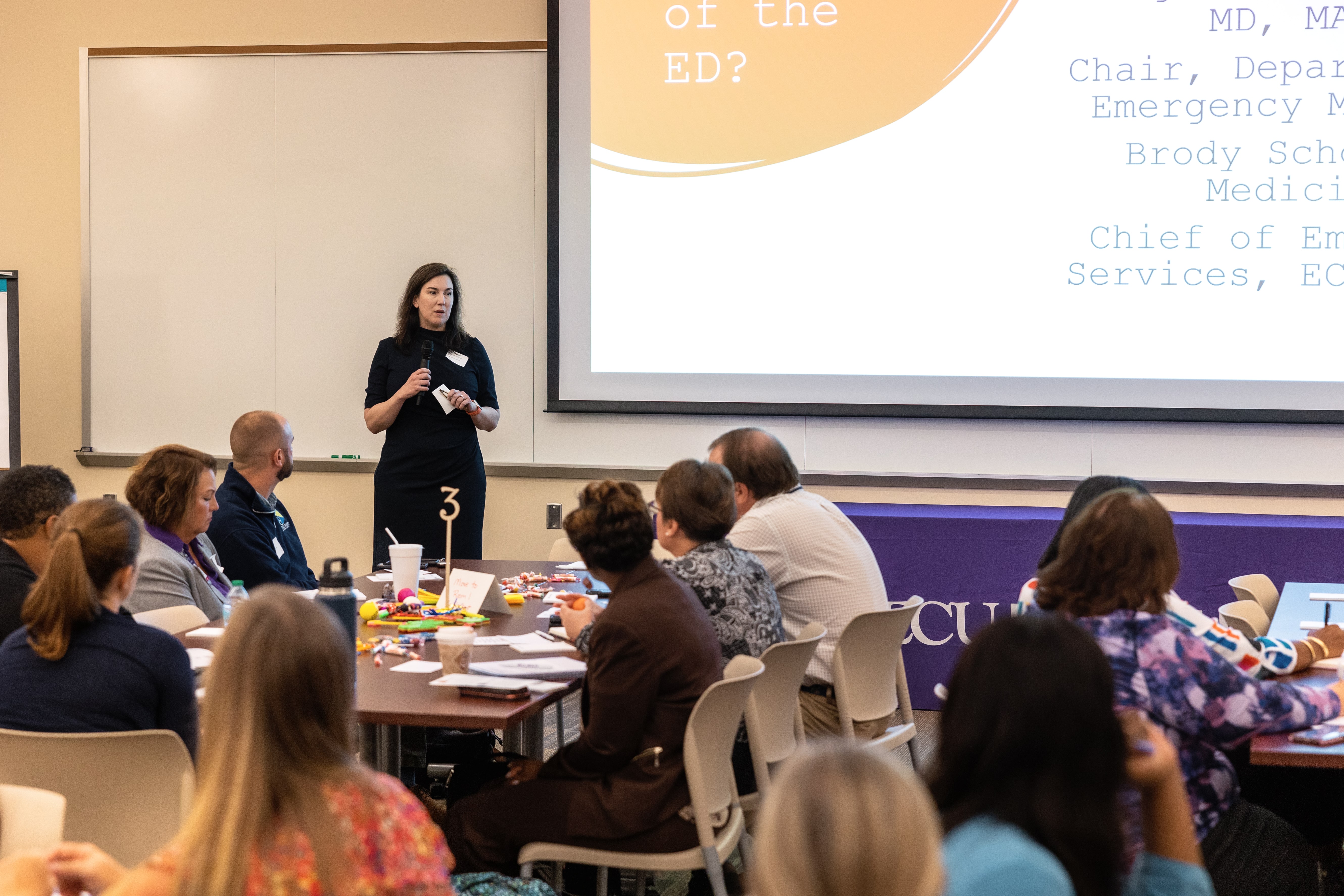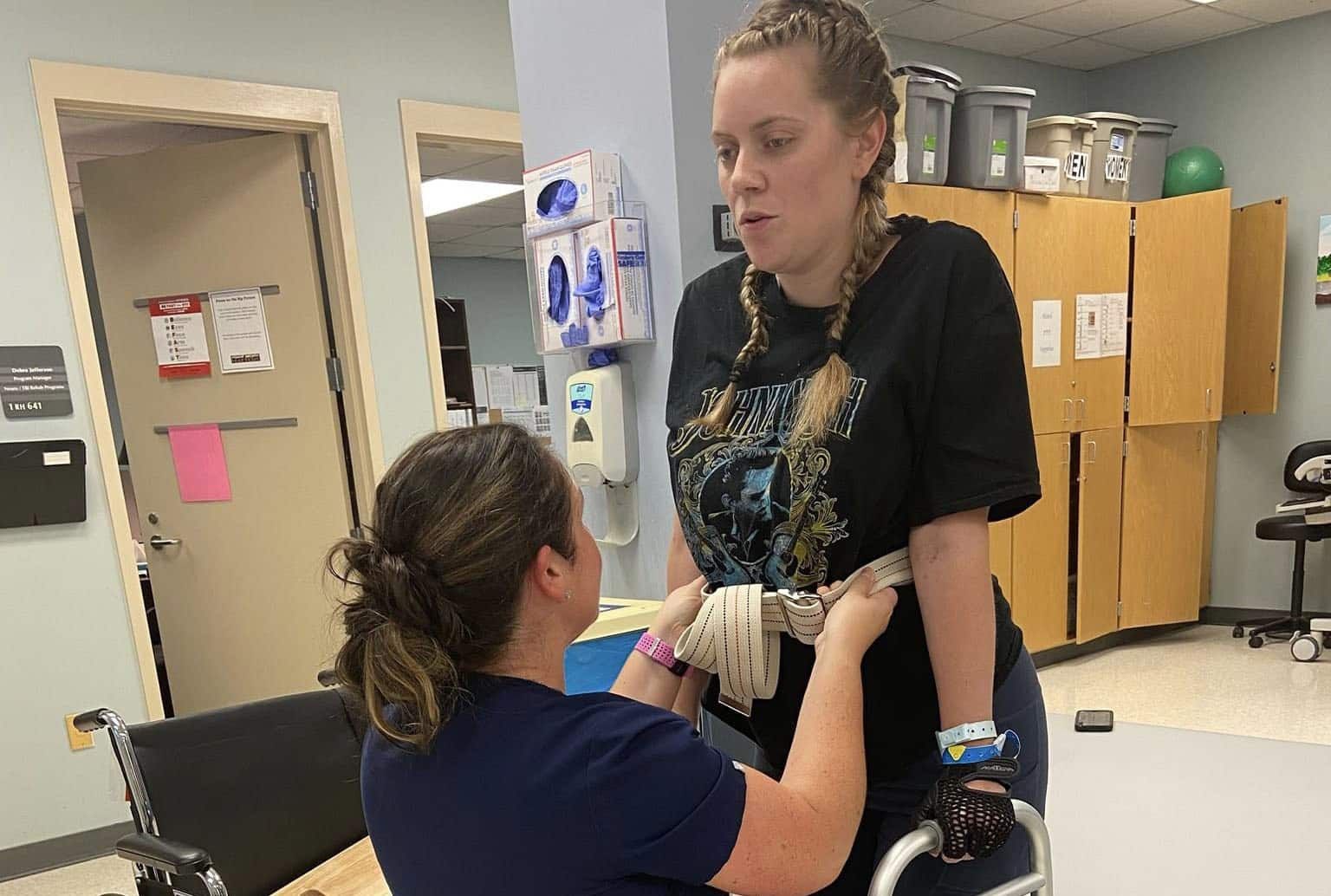It was a packed house at ECU Health’s Monroe Conference Center on Oct. 1, as ECU Health and Pitt County Department of Social Services (DSS) welcomed dozens of community-based health partners for a conference designed to help tackle a complex challenge: reducing unnecessary emergency department utilization to ensure enhanced access for those needing emergency care.
It is no secret that overcrowding in emergency departments is a challenge facing hospitals across the country. ECU Health Medical Center, the only Level I Trauma Center in ECU Health’s 29 county service area, is no exception. The medical center serves a largely underserved rural region where access to care is difficult for many. That includes primary care, behavioral health care and other services best rendered in outpatient settings. Combined with a disproportionate number of uninsured community members, this lack of access to care means patients often times end up at hospital emergency departments.
Dr. Leigh Patterson, chief of services for emergency medicine at ECU Health Medical Center and chair of emergency medicine at the Brody School of Medicine at East Carolina University, said ECU Health’s nine hospitals will see nearly 250,000 visits to the emergency department this year, with more than half of those occurring at the medical center. She said conversations with key community health leaders, like the one hosted by ECU Health and Pitt County DSS, can help ensure community members are aware of, and have access to, non-emergent health care resources outside the emergency department setting.
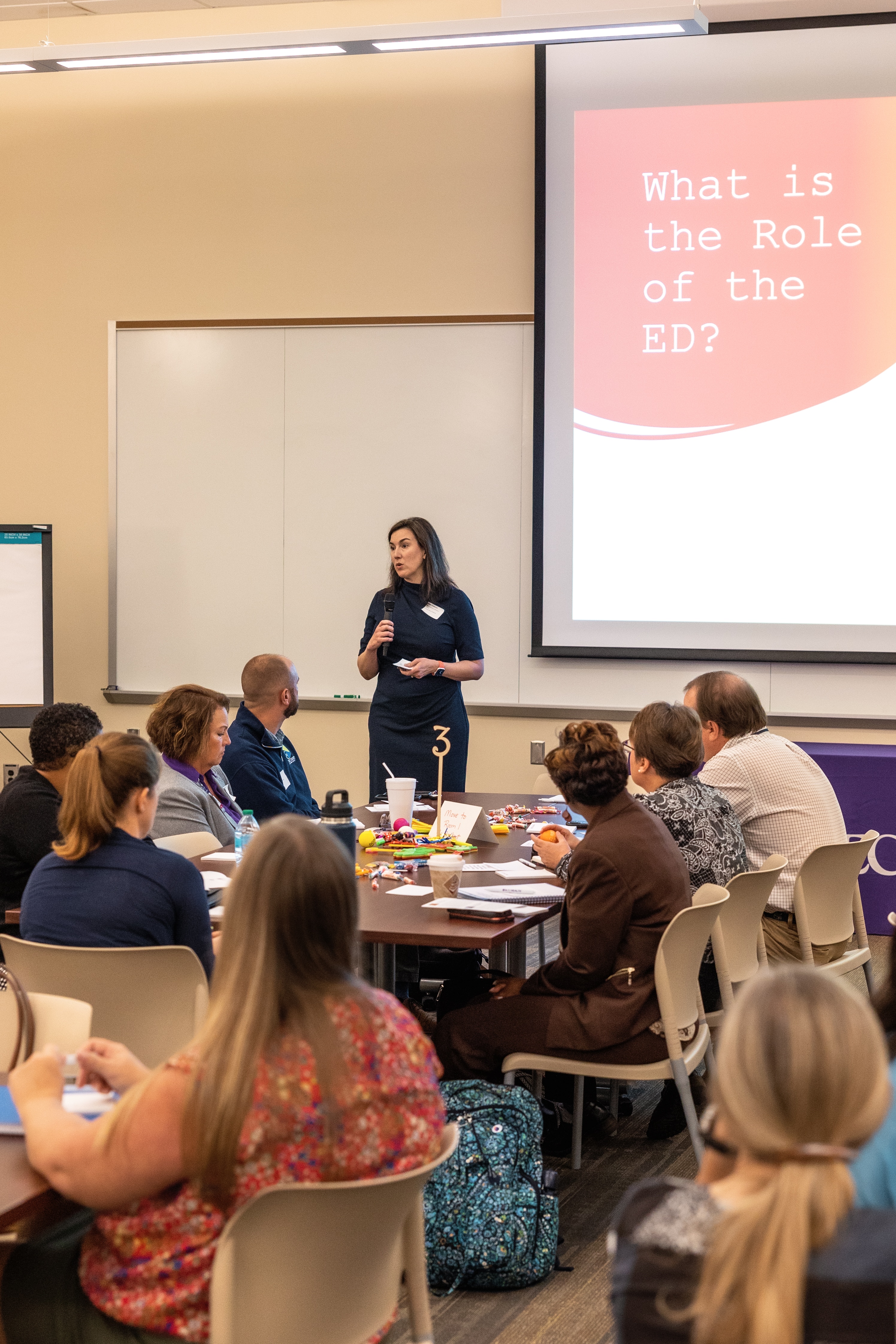
“When I look at what happens inside the emergency department, I see the opportunity for us to help fill the care gaps that exist outside of it,” Dr. Patterson told the group, noting that she sees about 225 adult patients per day in the medical center ED, about 40% of whom could be more appropriately served in an outpatient setting. “When it comes to addressing this problem, it will take all of us as a health care community to make meaningful change. That’s why I’m heartened that so many of you have joined us today to work together toward solutions that make an impact in our community.”
The conference represented true regional community collaboration. Health care partners present at the conference included ECU Health, DSS Directors from across eastern North Carolina, Juvenile Justice, Trillium Health Services, Public School leaders, NC DHHS, payors and other eastern North Carolina hospitals and key stakeholders.
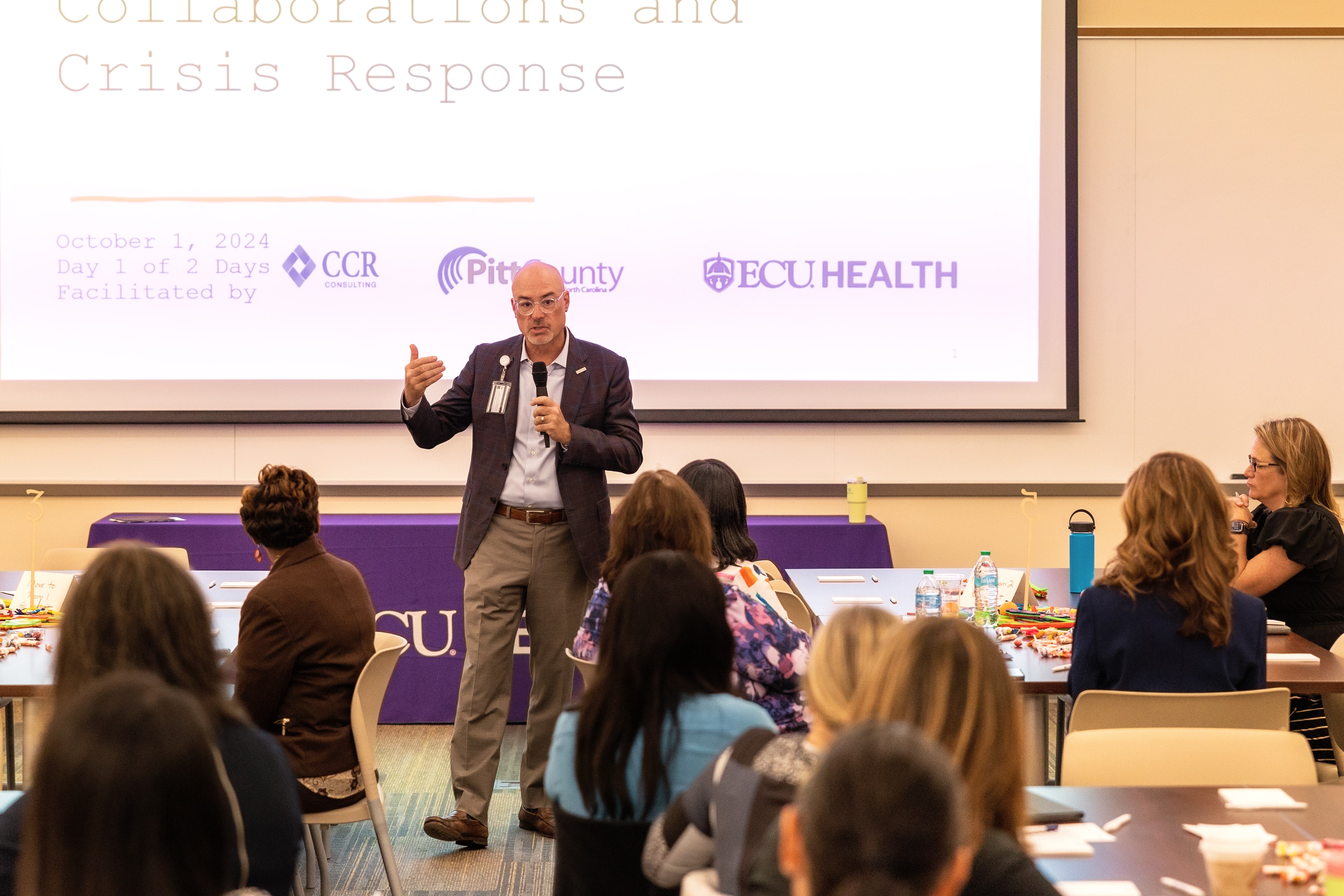
“The ECU Health/Pitt County DSS ED conference was an excellent example of cross system collaboration,” said conference co-sponsor Sharon Rochelle, director, Pitt County DSS. “This was a day to build mutually beneficial partnerships that have common goals to better serve the children and adults of the community.”
The conversation focused on both adult and pediatric/adolescent patient populations and heavily examined the challenges that behavioral health patients face accessing care. Despite the new inpatient behavioral health hospital slated to open in Greenville in 2025, those in attendance agreed that the issue needed immediate attention which involves creating increased interconnectedness among those providing care both in the community and in the hospital setting.
“We are grateful for all agencies involved in this important and challenging work,” said Jacob Parrish, vice president of capacity and throughput at ECU Health. “We know that the complex challenges we face cannot be solved at emergency departments alone. We are fortunate to have so many committed partners who share our vision for continuous improvement through strong relationships and close collaboration. Together, we can ensure the highest quality of care for communities across the East.”
The recent meeting was the first day of the two-day conference, largely centered around examining the issues through open and honest conversations. Those in attendance will reconvene later in the month for the second meeting to develop an action plan with concrete steps and strategies for improving access to care and reducing unnecessary ED utilization in eastern North Carolina.
“This is a complex set of issues, but I am confident we have the right people in our community committed to finding the solutions,” said Brian Floyd, ECU Health chief operating officer. “While these challenges are not exclusive to our health system or region, I know that together we can help support our emergency departments and improve the experience for those needing access to high-quality emergency care which is rendered at our hospitals every single day.”
Resources
ECU Health Rehabilitation will host its 13th annual Run, Walk and Roll to Independence event on Saturday, Nov. 9, bringing together former patients, their families and community members of all physical abilities. Participants can choose between a 5K or 1K course, with proceeds supporting vital rehabilitation programs. This year’s event carries special significance for Brittany Parker, who is returning not just as a participant but as a symbol of resilience after her own journey through rehabilitation.
In August 2023, Parker was navigating her first week back at work after maternity leave when she began experiencing unusual symptoms. What started as a mild tingling sensation in her fingers and toes on Monday gradually escalated. By the end of the week, Parker felt increasingly weak and fatigued, and by Friday, she could no longer lift her three-month-old baby.
Initially attributing her symptoms to exhaustion or perhaps low iron, Parker realized something was seriously wrong when she struggled to stand and walk. After falling at home, she and her family made the decision to go to the emergency room.
At the hospital, doctors quickly identified the underlying cause of her symptoms: Guillain-Barre syndrome (GBS), a rare but serious autoimmune disorder in which the body’s immune system mistakenly attacks the peripheral nerves. The condition can lead to muscle weakness, paralysis, and in severe cases, respiratory failure.
“By the time I reached the hospital, I could no longer lift my arms or legs,” Parker said.
At ECU Health Medical Center, she was diagnosed early, and treatment began right away, which helped stop the progression of the disease.
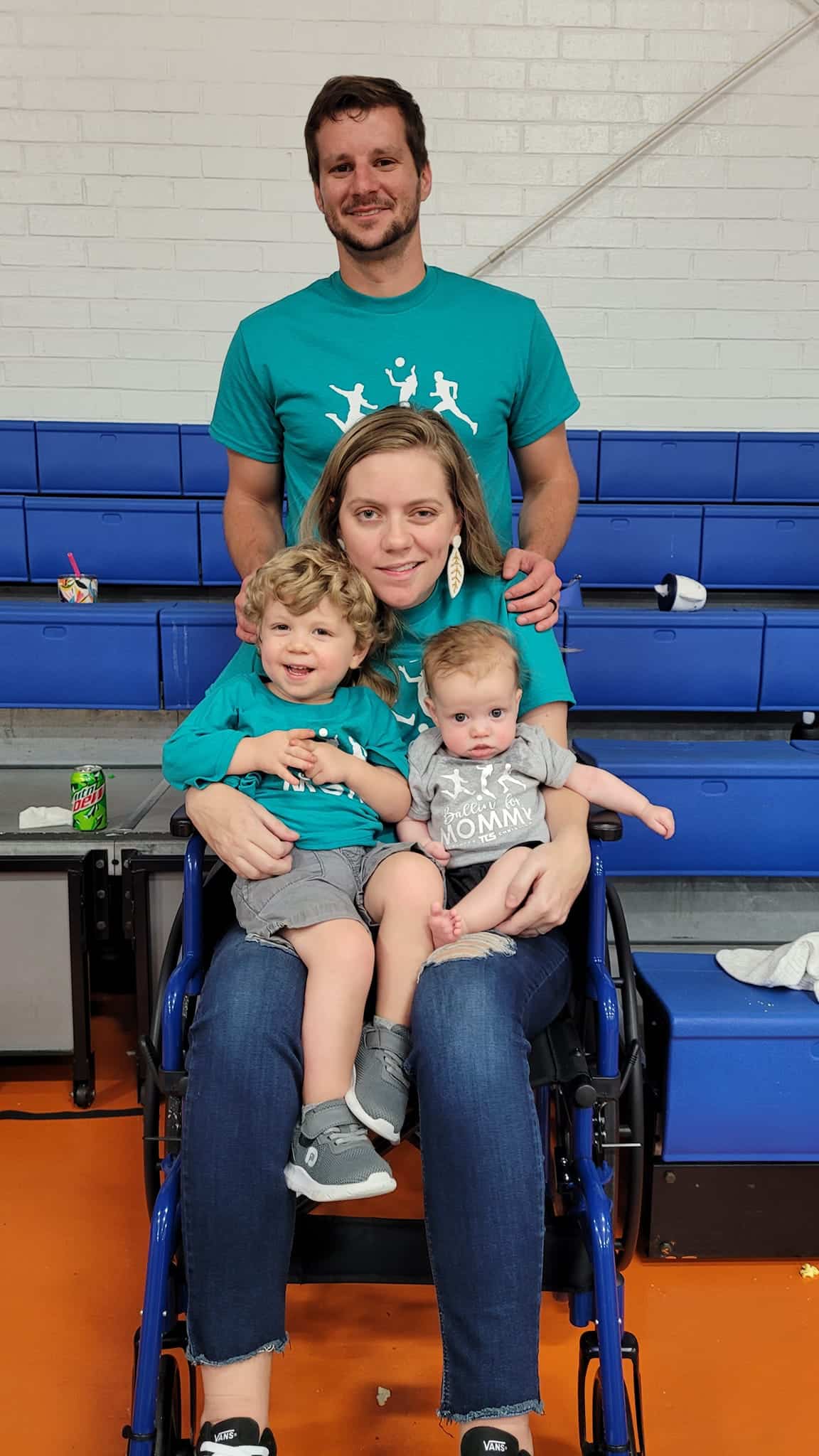
While her physical symptoms improved, Parker faced a new challenge: learning how to do everything again. After two weeks in the hospital, she was transferred to ECU Health’s rehabilitation center, where she began the long road to recovery.
“I had to relearn how to walk and even how to swallow,” said Parker.
The rehabilitation process was difficult, but Parker found strength in her care team.
“Everyone I worked with was amazing, from physical therapists to speech therapists. Melissa, my physical therapist, was so positive and encouraging. She celebrated every small victory with me, which made me want to push harder,” Parker said.
For four weeks, Parker worked tirelessly in rehab, gradually regaining the strength to walk, eat and move on her own again. Her recovery exceeded expectations, and she was able to return home earlier than anticipated.
“Being back home with my kids motivated me to recover even faster,” she said.
While doctors initially estimated her recovery could take up to a year, Parker was walking independently just three months after her diagnosis. She credits her faith, family support and the dedication of her care team for helping her through such a challenging time.
“I was so thankful to have a strong support system around me because not everyone is as fortunate,” she said. “I had such a great experience in rehab, and I want to show my support and tell everyone how amazing they are.”
Now, she’ll be able to do just that at the Run, Walk and Roll event where she will have a chance to connect with other rehab patients and share her perspectives.
“Brittany’s journey from being unable to walk to participating in the Run, Walk and Roll event is a powerful testament to her resilience and the exceptional care she received at ECU Health,” said Kasey Shue, recreational therapist, ECU Health Rehabilitation, and organizer of the Run, Walk and Roll event.
Through her participation, she hopes to inspire others and raise awareness about the importance of rehabilitation services. To learn more about the event and sign up, please visit: https://www.bikesignup.com/Race/NC/Greenville/RunWalkRoll.
Eastern North Carolinians know all too well the devastation that accompanies major hurricanes. When Hurricane Helene hit our neighbors to the west, ECU Health and Eastern Healthcare Preparedness Coalition (EHPC) team members did not hesitate to answer the call. Since Friday, these specialized team members have been providing ongoing support to hospitals and health care facilities as they work to ensure patients can be safely cared for in the fallout of the catastrophic storm.
“Our folks are great. As soon as this happened, our disaster preparedness group started putting together what we have, how can we help and how we can get there,” said ECU Health Chief Operating Officer Brian Floyd. “One of the things I love about ECU Health is we are filled with people who just care. I could not be more proud of the collective response from our team members, including those who went as part of our organizational response, and those who are helping donate to recovery efforts.”
Across western North Carolina, more than 20 hospitals were impacted by the storm and thousands of people left devastated. Some are without water and power and others are in various phases of assessment and stabilizing operations. Beyond facility issues, hazards rendered the roads dangerous and, in some cases, unable to be used at all.
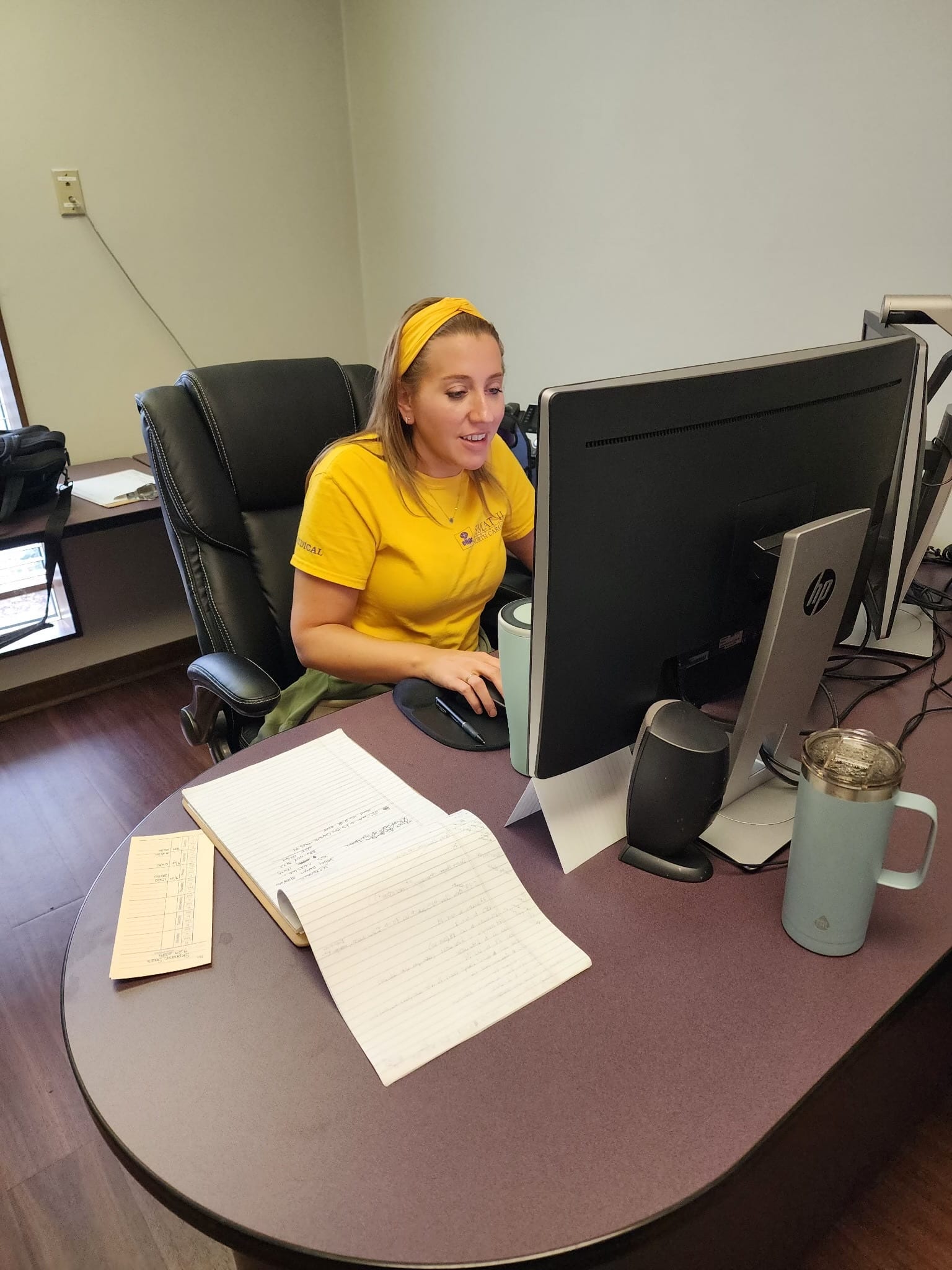
Through our EHPC, ECU Health is closely aligned with NC Emergency Management for daily coordination of hospital and patient care needs. In one example, the team directly supported the evacuation of 23 residents in a care facility and help relocated the individuals to a safer location using the Medical Ambulance Bus.
Stephanie Seals, disaster services specialist with EHPC, was among the first group of team members to deploy to western North Carolina. Within 24 hours, the team “pre-deployed” to the area carrying supplies, the ambulance bus and experts to help. The ECU Health team was among the first to arrive in the region in the early hours after the storm moved through.
Shortly after she arrived on-site in western North Carolina, Seals was tasked with an important job by the state: directing the Statewide Patient Coordination Team support cell. This support cell – which is vitally important given the outages impacting connectivity at hospitals and health care facilities – brings all transfer centers together to help expedite critical care transports out of the western part of the state and to safer locations.
Many transfers from impacted hospitals to new locations have required assistance from the Statewide Patient Coordination Team support cell. This process involves assessing patient needs, working to find capacity at a new facility and helping to arrange critical care transport.
“It’s hard to overstate the importance of this work, especially during a disaster that impacts critical communication services that care teams and patients rely on,” said Seals. “It takes tremendous coordination to ensure we can get patients safely transferred to a facility that has availability to care for them. In some cases, we’re receiving phone calls from people huddled in the corner of the hospitals because that’s the only place they can get service for a few moments. From there, we take that information to help arrange the necessary transport services.”
Should patients need to be transferred as far east as ECU Health, the system stands ready to serve patients and families from western North Carolina. In the meantime, as recovery efforts continue, ECU Health and EHPC are continuing to do their part to support those impacted by the devastation of the storm in whatever way they can.
“ECU Health is deeply involved and fully aware of what’s going on and is staying connected in the work, and we need to remember this is not a short-term turnaround,” said Floyd. “This issue is going to take a long time for them to get to some form of stability. But we’re here to help and committed to doing what we can to support those impacted.”
When Dr. Tate Holbrook, a pediatric hematologist, founded the Comprehensive Sickle Cell Disease Program at East Carolina University in 1979, he was inspired by the need for basic health care services specifically designed to meet the unique needs of sickle cell patients.
Now, 45 years later, the program stands proudly as a leader in North Carolina at providing state-of-the-art medical care for those living with sickle cell disease, and its founder credits the annual Tate Holbrook Annual Sickle Cell Disease Update conference as a key component of that success.
“ECU has a reputation as being a hands-on, compassionate and people-centered organization,” said Dr. Holbrook, who the conference was named after following his retirement in 2022. “The care at ECU Health Medical Center is exceptional and it’s because of the people who really care. This conference is a big cooperative effort that brings like-minded people together such as researchers, pharmaceutical companies, and others who are helping create advancements in treatment for sickle cell patients.”

The Tate Holbrook Annual Sickle Cell Disease Update is hosted by East Carolina University’s Comprehensive Sickle Cell Program and the Department of Pediatrics Hematology/Oncology, in collaboration with Eastern AHEC. The goal of the conference is to bring together medical professionals and patients to bridge the gap of communication and to improve treatment for patients with sickle cell disease.
To meet this goal, professionals with knowledge and recognition in the sickle cell community discuss the latest advances in treatment of sickle cell disease, cutting edge research, established and new medications and therapies, as well as psychosocial interventions. Conference organizers aim to encourage further discussion between providers and patients to create an environment focused on patient needs.
The most recent conference was hosted at Eastern AHEC on Sept. 6 and brought together medical professionals with 25 patients and six community-based vendors together to learn in a collaborative environment and provide resources to those living with sickle cell disease.
“I’ve come to this conference every year since 2009 when I retired and moved down here,” said Stephanie King, 70, who lives with sickle cell disease. “I think people with the disease should come to these types of events because there’s so much to learn about sickle cell. I go places and I speak about my experience and I have young people that come up to me and say ‘Oh my gosh, you can live this long with sickle cell disease?’ and I always say ‘Yes!’ With medical enhancements and the resources available, we can make it to 70 and beyond.”
Patients like King are at the heart of the conference. The concept of collaborative comprehensive care helps provide state of the art medical care for patients, including education of families and health care providers, psychosocial support to patients, families and community groups, and access to new and innovative therapies. It also emphasizes a close working relationship with other agencies involved in the care of individuals with hemoglobinopathies, including medical centers, community-based sickle cell programs, and the NC Sickle Cell Syndrome Program.
The collaborative approach is what drives progress forward for those living with sickle cell disease, according to Dr. Beng Fuh, current program director of the Comprehensive Sickle Cell Disease Program at ECU.
“One of the most important parts of this conference is that it brings patients with sickle cell together with medical providers,” said Dr. Fuh. “We get to facilitate that exchange between patients and providers to learn how we can improve things and how we can get better. Sickle cell functions best when we take that collaborative approach. When we can hear from each other, we make our providers better and we improve understanding of the disease for patients. When we’re here together we gain a greater appreciation for the fact that we’re all on the same team.”
The Great 100 Nurses in North Carolina honors the nursing profession by recognizing nurses around the state for their commitment to excellence. The recipients are distinguished for their outstanding professional ability as well as their contributions to improving health care services in their communities. This year, 19 ECU Health nurses were recognized as honorees, including Dennis Campbell, II, Myra Thomson, Alex Gilbert, Gina Coldwell and Lou Ann Proctor.
Dennis Campbell, II
Although he is now the president of ECU Health Beaufort Hospital and the interim president at ECU Health North Hospital, Dennis Campbell, II began his career in 2004 as a nurse in the medical/surgical intensive care unit. Over time, he spent his early career in the emergency department, the burn center and the telemetry floor, and he was a staff nurse educator and a clinical educator for local nursing schools in his home state of Indiana.

However, a job opportunity brought him to eastern North Carolina, and he’s since navigated his way into quality leadership, corporate compliance, behavioral health and nursing leadership.
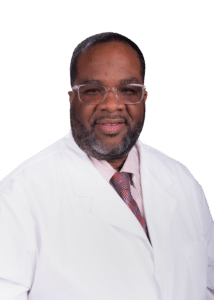 Dennis said finding his path to nursing was a winding road. “I was looking for something I could do that would provide a secure job,” he shared. “I shadowed a nurse in the local community as well as a respiratory therapist. What attracted me to nursing was how polished that nurse was. She was neatly dressed in white scrubs and a hat. The way she presented herself to her patients made me say, ‘I can do that.’” What kept Dennis coming back day after day was the difference he was making every day. “It’s the connection with people at the most vulnerable times of their lives,” he said. “I get to make the ordinary extraordinary, and if there’s something I can do to put a smile on your face, that also fills my cup.” That hasn’t changed since Dennis found his way into leadership roles. “It’s a platform that impacts healthcare and people in a larger way.”
Dennis said finding his path to nursing was a winding road. “I was looking for something I could do that would provide a secure job,” he shared. “I shadowed a nurse in the local community as well as a respiratory therapist. What attracted me to nursing was how polished that nurse was. She was neatly dressed in white scrubs and a hat. The way she presented herself to her patients made me say, ‘I can do that.’” What kept Dennis coming back day after day was the difference he was making every day. “It’s the connection with people at the most vulnerable times of their lives,” he said. “I get to make the ordinary extraordinary, and if there’s something I can do to put a smile on your face, that also fills my cup.” That hasn’t changed since Dennis found his way into leadership roles. “It’s a platform that impacts healthcare and people in a larger way.”
Still, Dennis was surprised that “little old me” was nominated for and selected as a Great 100 Nurse. “It says a lot about what my colleagues think about me, and I’m grateful,” he said. “And it’s good for all Great 100 nurses, because it’s often the case that we are the unsung heroes. It means people are taking notice and want to recognize those who give their heart and soul.” Dennis said the honor is also a legacy for his family. “They don’t get to go to work with me every day and see what I do, and my work is hard to quantify. To have that recognition is impactful to my family.”
Myra Thomson
 Myra Thomson, a nurse manager in the Medical Intensive Care Unit (MICU) and the Continuous Renal Replacement Therapy program at ECU Health Medical Center, decided to be a nurse because her mother was a nurse. “It was all I knew; I was raised in a medical profession home. It fit me and my personality,” Myra said.
Myra Thomson, a nurse manager in the Medical Intensive Care Unit (MICU) and the Continuous Renal Replacement Therapy program at ECU Health Medical Center, decided to be a nurse because her mother was a nurse. “It was all I knew; I was raised in a medical profession home. It fit me and my personality,” Myra said.
The East Carolina University graduate began her career with ECU Health right after graduation. During her clinical rotation on the medical intermediate unit, she had the opportunity to shadow in the MICU. This confirmed Myra’s conviction to work with the critically ill patient population. “I love that there’s a complexity, with more than one thing to treat,” Myra said. She also enjoys the MICU team. “It’s the place to be,” she said. “I love my team at work and outside of work. They call me if they need something, and I check in on them. They’re my people.”
Myra said it was amazing to find out she was named a Great 100 Nurse. “It’s an honor for me that the people I work with think enough of me to say what they did about me. It shows they’re exactly why I do what I do.” It’s also special that so many ECU Health nurses are recognized this year. “The nurses here work very hard across the system, and they deserve to be recognized. It makes you proud to work at ECU Health,” Myra said.
Alex Gilbert
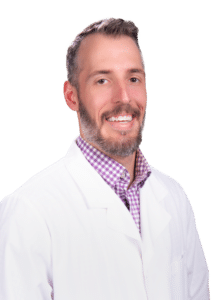 Alex Gilbert, a staff nurse III in the surgical intensive care unit (SICU), calls himself a “second generation nurse,” because both of his parents were also nurses. “Mom works in the ECU Health Cancer Center,” Alex said. “Dad was a flight nurse with EastCare. That’s how my parents met.”
Alex Gilbert, a staff nurse III in the surgical intensive care unit (SICU), calls himself a “second generation nurse,” because both of his parents were also nurses. “Mom works in the ECU Health Cancer Center,” Alex said. “Dad was a flight nurse with EastCare. That’s how my parents met.”
Alex used to watch his father on the helipad and wait for him to get off work, which sparked his own interest in a health care profession. That spark was reignited when his grandmother got sick during his senior year of high school. “That renewed my interest and showed me I could care for people. I knew I had a calling.”
After graduating from East Carolina University with his BSN, Alex split his time between the SICU and the ECU Health EastCare Transport Team as a flight RN. He also serves as an EMT-B in the community. Alex said he was surprised when he discovered he was a Great 100 Nurse honoree. “I can think of so many others who deserve this award,” he said. “We don’t do the job for recognition; we do what we do to care for people.” Alex did cite his passion for his work as a key factor in his success, as well as the support from his family and his co-workers. “It’s not just a nine to five job; it’s someone’s life. It’s an honor and a pleasure to care for someone. But I can’t take all the credit. My faith, my family and my co-workers all play a part. I’d put my team up against any in the country, and I wouldn’t be getting this award if not for them. I’m just a piece of the puzzle.”
ECU Health’s representation in the Great 100 Nurses is a testament to the care our nurses provide, and the education and support ECU Health provides its nurses, Alex said. “We’re the biggest level one trauma center East of I-95,” he said. “Our patients are the sickest of the sick, and our nurses are on the top of their game.”
Gina Coldwell
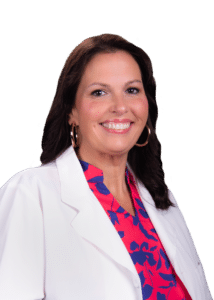 A Newport News, Virginia, native, Gina Coldwell knew she had an interest in nursing early-on, but she couldn’t go to school while caring for her four small children. “I was a stay-at-home mom for 15 years,” she said. “But then I got divorced and was working two minimum-wage jobs and I wanted to do something I enjoyed.” That’s when Gina went back to school and received her associate degree in nursing from Edgecombe Community College in 2019. “I started working at ECU Health that following summer,” Gina said. She began on the Neuroscience Intermediate Unit, but she also continued her education to complete her BSN from East Carolina University in 2021, followed by enrolling in a master’s program at Carson Newman University, with plans to graduate in 2025.
A Newport News, Virginia, native, Gina Coldwell knew she had an interest in nursing early-on, but she couldn’t go to school while caring for her four small children. “I was a stay-at-home mom for 15 years,” she said. “But then I got divorced and was working two minimum-wage jobs and I wanted to do something I enjoyed.” That’s when Gina went back to school and received her associate degree in nursing from Edgecombe Community College in 2019. “I started working at ECU Health that following summer,” Gina said. She began on the Neuroscience Intermediate Unit, but she also continued her education to complete her BSN from East Carolina University in 2021, followed by enrolling in a master’s program at Carson Newman University, with plans to graduate in 2025.
Gina said she didn’t know what specialty she wanted after initially graduating from nursing school. For her, the team on 3 North drew her to the neuroscience unit. It was a challenging first year, but Gina said she has grown to love the challenge. “It’s hard to not take the work home with me,” she said. “But it’s so fascinating. You get such a diverse group of people, from someone who fell and broke their back to someone who had a stroke. It’s not an easy fix, but you have the benefit of seeing the fruits of your labor and how your patients improve. It’s so rewarding and fulfilling.”
That passion is one reason Gina was nominated for and recognized as a Great 100 Nurse. “I was shocked when I found out,” Gina said. “I was proud because I still consider myself a baby nurse. And we have amazing nurses at ECU Health. We’re a Level I Trauma hospital, and everything we deal with is big. You must have your heart in it, and you must have good leadership that recognizes that heart.” Gina also works with new graduates and new hires. “I love to teach and train,” she said. “And if I don’t know something, I ask someone who does. We’ll find out the answer together.”
Lou Ann Proctor
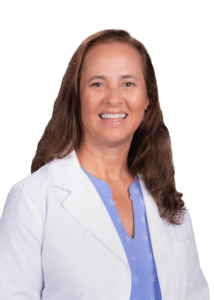 Lou Ann Proctor, a staff nurse IV in the pediatric intensive care unit (PICU), calls herself a legacy Great 100 Nurse. “My mother, Janice Proctor, was in the first group selected to be a Great 100 Nurse in 1989, the year I graduated from nursing school at ECU,” Lou Ann said. “My Aunt Lucy Weaver and Aunt Becky Lewis were also chosen in 1994 and 1993. Sadly, I just lost my mother last year, and she would have loved this.”
Lou Ann Proctor, a staff nurse IV in the pediatric intensive care unit (PICU), calls herself a legacy Great 100 Nurse. “My mother, Janice Proctor, was in the first group selected to be a Great 100 Nurse in 1989, the year I graduated from nursing school at ECU,” Lou Ann said. “My Aunt Lucy Weaver and Aunt Becky Lewis were also chosen in 1994 and 1993. Sadly, I just lost my mother last year, and she would have loved this.”
It was her mother’s work that inspired Lou Ann to become a nurse in the first place. “My father was a farmer, so when I turned 15, I wanted to get out of the tobacco fields and I went to work with my mother at Edgecombe General Hospital in Tarboro. I got to work beside her and see how amazing she was at her job,” she said.
Lou Ann has continued that legacy by being nominated as a Great 100 Nurse several times before being an honoree this year, although she remains humble about the work she does every day. “I’ve been a bedside nurse for 35 years and have been involved in Nurse Congress, Quality/EBP Council and my unit council, but there are so many nurses I would nominate for this award. That recognition is overdue and well deserved for them.” When she found out she has won the award this year, the moment was bittersweet. “My co-workers nominated me this time and I was both thrilled and heartbroken to be selected,” she said. “It would have meant so much if my mother was still here. But my Aunt Lucy and family plan to attend the Gala with me and that will make it special.”
The recipients will be honored at a statewide gala in September, to be held in Concord.
Greenville, N.C. – ECU Health performed the first ever pacemaker implantation with Elutia’s EluPro® BioEnvelope on Sept. 5. EluPro, a Food and Drug Administration (FDA)-approved device, is the first antibiotic-eluting device designed to prevent post-operative complications for Cardiac Implantable Electronic Devices (CIEDs) such as pacemakers and defibrillators.
“We are proud to be the first to perform a pacemaker implantation with the EluPro BioEnvelope, which is a testament to the work our cardiovascular teams do every day to improve the health and well-being of eastern North Carolina,” said Jay Briley, president, ECU Health Medical Center. “Being the first to perform this groundbreaking procedure with the EluPro BioEnvelope underscores our commitment to bringing cutting-edge solutions directly to the communities we serve. Our patients can access the highest level of care without the need to travel long distances, ensuring that advanced cardiovascular treatments are available right here in eastern North Carolina.”
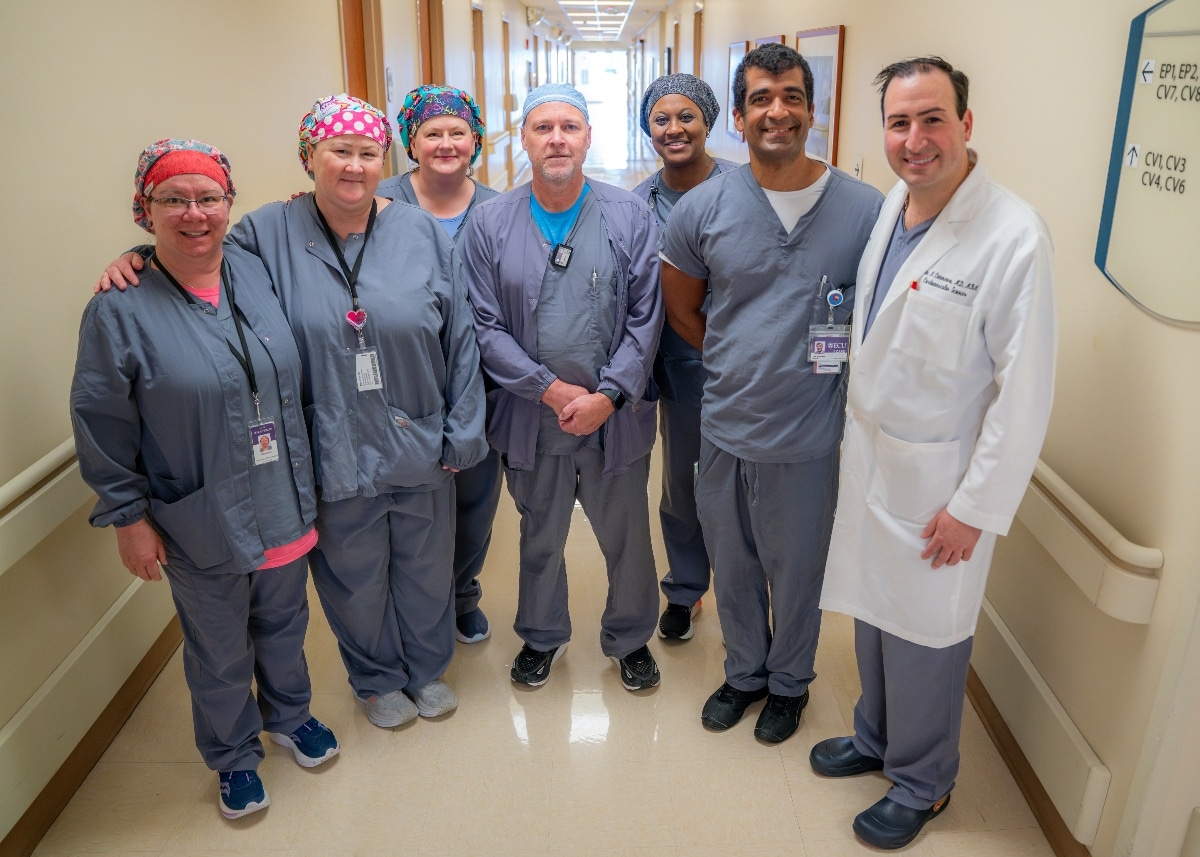
For high-risk patients, including those with underlying health conditions or advanced age, traditional pacemakers carry a risk of complications such as infection, migration and skin erosion, affecting five to seven percent of patients nationwide, according to the FDA. These issues arise when the body’s immune system treats the device as a foreign object, leading to inflammation, device movement, and, in some cases, serious infections. The EluPro BioEnvelope offers an innovative solution for high-risk patients by combining antibiotic therapy with advanced tissue engineering.
“Eastern North Carolina faces high rates of chronic illnesses like heart disease, diabetes and hypertension, making access to advanced cardiovascular care crucial for our community,” said Dr. John Catanzaro, John “Jack” Rose distinguished professor and chief of the Division of Cardiology at the Brody School of Medicine at East Carolina University and director of the East Carolina Heart Institute at ECU Health Medical Center. “Patients with co-morbidities are at higher risk for infection after procedures like pacemaker implantations, and this new technology is a significant step forward in addressing these challenges, as it not only improves patient outcomes but also helps prevent complications that can arise from traditional procedures. I am grateful to the team that helps bring innovations like the EluPro BioEnvelope to our region, demonstrating our commitment to reducing health disparities and ensuring our patients receive the best care possible.”
ECU Health team members that were part of the new procedure include: John Catanzaro, MD, MBA, Jan Lopes, MD, Mark Dixon, RN, David Rouse, cardiovascular technologist, and Tracy Fulcher, cardiovascular technologist. As the academic health system for eastern North Carolina, ECU Health and the Brody School of Medicine perform nearly 1,000 pacemaker implantations per year and ensure patients benefit from the latest medical innovations without having to travel far from home. This integration of academic expertise and clinical care not only enhances patient outcomes but also serves as a vital resource for training the next generation of health care professionals. ECU Health’s commitment to leading the way in advanced cardiovascular treatments demonstrates our ongoing mission to address rural health disparities and improve the well-being of the communities we serve.
The Great 100 Nurses in North Carolina honors the nursing profession by recognizing nurses around the state for their commitment to excellence. The recipients are distinguished for their outstanding professional ability as well as their contributions to improving health care services in their communities. This year, 19 ECU Health nurses were recognized as honorees, including Kimberly Askew, Jessica Noble, Amber Oakes and Kathryn Jarvis.
Kimberly Askew
 Like so many aspiring nurses, Kimberly Askew decided to pursue nursing because of her mother. “It was my dream to be a labor and delivery nurse like my mother,” Kimberly said. “She went to nursing school and graduated when I was in eighth grade, and I saw what a difference it made for her and our family. She has served as a great inspiration for me in all aspects of my life.”
Like so many aspiring nurses, Kimberly Askew decided to pursue nursing because of her mother. “It was my dream to be a labor and delivery nurse like my mother,” Kimberly said. “She went to nursing school and graduated when I was in eighth grade, and I saw what a difference it made for her and our family. She has served as a great inspiration for me in all aspects of my life.”

Kimberly started working at ECU Health Roanoke Chowan Hospital 19 years ago as a certified nursing assistant, and through the Homegrown program, she attended Roanoke Chowan Community College to get her associate in nursing degree. In the ensuing years, she has served as a charge nurse, a preceptor, a childbirth educator, a unit educator and an ALSO instructor. She spent 12 years in labor and delivery, three in the medical/surgical unit and the last four years in the peri-operative unit.
To be recognized as a Great 100 Nurse is an honor, she said, one that acknowledges the work she does and the difference she makes. “It means a lot that others see what I’m doing. What we as ECU Health nurses do for our communities is so very important.” Yet, she also said it was a shock when she learned she’d won the award. “I could name at least a dozen others who deserve this recognition. We as humans always have self-doubt and I think everyone deserves to see how others see them.”
Jessica Noble
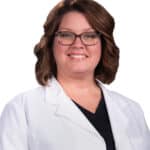 As a registered nurse with over 20 years of experience in maternal health, Jessica Noble currently serves as the perinatal nurse champion and navigator for ECU Health Medical Center. She received her BSN from East Caroline University and a master’s in nursing education from the University of North Carolina at Wilmington, and she is an active member in the Association of Women’s Health, Obstetric, and Neonatal Nurses and serves on the DHHS Maternal Health Task Force. These partnerships have, she said, “made eastern North Carolina and ECU Health the best place to have a baby.”
As a registered nurse with over 20 years of experience in maternal health, Jessica Noble currently serves as the perinatal nurse champion and navigator for ECU Health Medical Center. She received her BSN from East Caroline University and a master’s in nursing education from the University of North Carolina at Wilmington, and she is an active member in the Association of Women’s Health, Obstetric, and Neonatal Nurses and serves on the DHHS Maternal Health Task Force. These partnerships have, she said, “made eastern North Carolina and ECU Health the best place to have a baby.”
Her passion for nursing began when she was three years old. “My great-grandmother looked after me while my mother worked, and I vividly recall climbing to reach the kitchen cabinet to get her medicine,” Jessica said. “She cared for me when I was ill, and I cherished the opportunity to care for her in return.”
While she is proud to be recognized as a Great 100 Nurse, Jessica said the honor was due in part to knowing that the Great 100 recognizes exceptional nurses. “This recognition makes me feel accomplished and proud to be a part of such a distinguished group of nurses across North Carolina and from ECU Health. Having 19 nurses from ECU Health recognized reflects how much ECU Health values its team members and is committed to their success.”
Amber Oakes
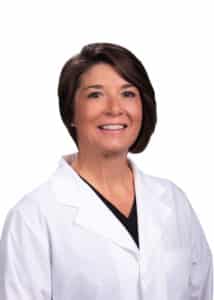 An eastern North Carolina native, Amber Oakes received her associate degree in nursing from Pitt Community College and her BSN from Western Carolina University. She’s worked at ECU Health Medical Center for 14 years, and most recently she specialized in gynecology/oncology in the outpatient clinic at ECU Health Cancer Center.
An eastern North Carolina native, Amber Oakes received her associate degree in nursing from Pitt Community College and her BSN from Western Carolina University. She’s worked at ECU Health Medical Center for 14 years, and most recently she specialized in gynecology/oncology in the outpatient clinic at ECU Health Cancer Center.
Her desire to support patients with cancer began with a friend. “My desire to support a best friend who was fighting for her life launched me into a natural path of caring for others,” she said. “Building relationships with the care team inspired me to care for others with empathy and compassion, and I’m forever grateful for all those nurses did for my friend.” Amber also mentioned what she called her “dynamic” view of nursing. “I see it through the lens of a patient who lives with Multiple Sclerosis; a caregiver to my mother who battled breast cancer and a professional who cares for the oncology patients in eastern North Carolina.”
Amber said she is honored to be named among the Great 100 Nurses: “The legacy of the Great 100 Nurses of NC is revered throughout ECU Health and highly coveted. It is a testament to our organization’s emphasis on continuing education, advanced training, quality improvement efforts and exceptional patient care.” Her strong work ethic and her team help her apply her knowledge, skills and experience with the success of their clinic.
Kathryn Jarvis
 Kathryn Jarvis, the senior director for Children’s Services at ECU Health Maynard Children’s Hospital, has been a nurse at ECU Health Medical Center for 12 years. She received both her BSN and MSN from ECU and her doctorate of nursing practice (DNP) with a concentration in nurse executive leadership from the University of North Carolina at Wilmington. Kathryn is also a part-time faculty member for ECU’s DNP program. Her hard work has been in an effort to improve the care for pediatric patients throughout eastern North Carolina. “I want every child who needs medical care at one of our facilities to receive best practice, compassionate, patient and family-centered care,” she said.
Kathryn Jarvis, the senior director for Children’s Services at ECU Health Maynard Children’s Hospital, has been a nurse at ECU Health Medical Center for 12 years. She received both her BSN and MSN from ECU and her doctorate of nursing practice (DNP) with a concentration in nurse executive leadership from the University of North Carolina at Wilmington. Kathryn is also a part-time faculty member for ECU’s DNP program. Her hard work has been in an effort to improve the care for pediatric patients throughout eastern North Carolina. “I want every child who needs medical care at one of our facilities to receive best practice, compassionate, patient and family-centered care,” she said.
For as long as she could remember, Kathryn wanted to be a nurse. “I used to want to be a teacher during the week and a nurse on the weekends, but I quickly changed my mind when I realized a person needed a few days off now and then,” she said. Now she has a true passion for pediatric nursing, where she can “care for some of the most resilient patients out there.”
Kathryn expressed deep appreciation for even being nominated as a Great 100 Nurse, let alone to be an honoree. “I don’t think I can adequately express what it means to be recognized as a Great 100 nurse. I have known a multitude of amazing nurses who have received this recognition, and it makes me proud to join them.”
The recipients will be honored at a statewide gala in September, to be held in Concord, North Carolina.
The Dr. Irons HealthAssist Clinic at JOY Community Center officially opened its doors on Tuesday, Sept. 10, following a ribbon-cutting ceremony led by Dr. Thomas Irons.
The clinic will provide free non-emergent health care and disease management services to uninsured individuals in the community.
Dr. Irons, a lifelong advocate for community health, served as the chief medical officer for Access East, a nonprofit ECU Health affiliate. He recently retired from his distinguished career as a professor at East Carolina University’s Brody School of Medicine, where he was also a pediatric physician. In recognition of his decades of service, Dr. Irons was awarded the Order of the Longleaf Pine, North Carolina’s highest civilian honor.
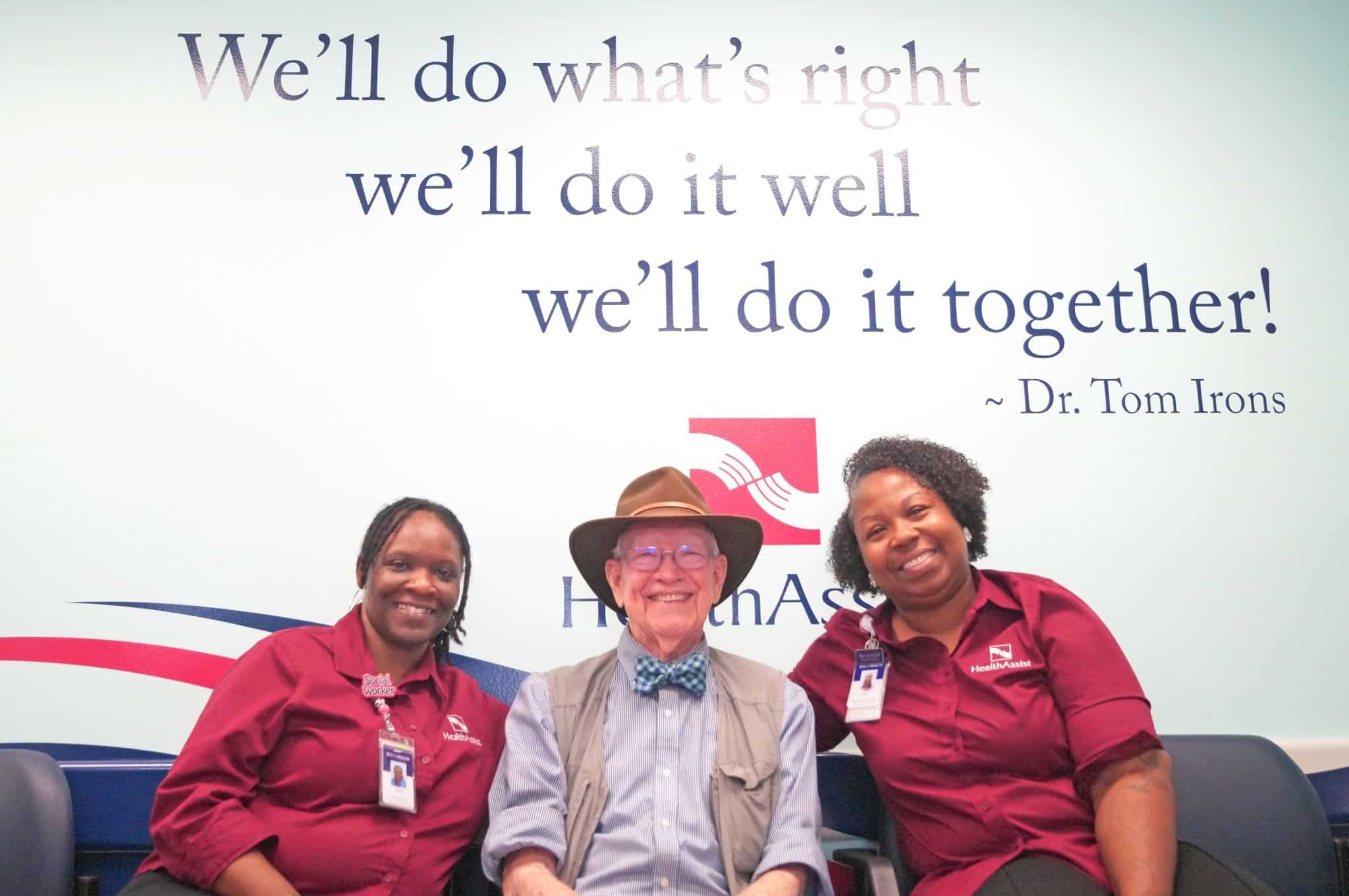
The clinic, also known as the Pitt County Care Clinic at JOY, is housed within the same building as the JOY Soup Kitchen and has been serving patients in various capacities for over a year. It provides comprehensive wraparound health services, including medication assistance, patient education and connections to local resources. The clinic also hosts regular outreach events with community partners such as PiCASO (Pitt County AIDS Service Organization) and the Food Bank of Central & Eastern North Carolina.
Equipped with two standard exam rooms, the clinic will offer free care for non-emergency conditions like colds, bug bites and rashes, as well as manage chronic illnesses such as heart disease, diabetes, high blood pressure and high cholesterol. In-house lab testing for A1C blood-sugar levels and cholesterol will be available, along with COVID-19 testing kits.
Uninsured patients from Pitt and surrounding counties, including Beaufort, Greene, Edgecombe, Hertford, and Martin, will also have the opportunity to join the Access East HealthAssist program, which helps coordinate more comprehensive health care at no cost.
The clinic is open weekdays from 10 a.m. to 2 p.m., with a nurse practitioner available on Wednesdays. Dr. Irons will mentor the clinic’s new nurse practitioner, a recent Duke University graduate. The JOY Community Center & Soup Kitchen is located at 700 Albemarle Ave. in Greenville.
The Great 100 Nurses in North Carolina honors the nursing profession by recognizing nurses around the state for their commitment to excellence. The recipients are distinguished for their outstanding professional ability as well as their contributions to improving health care services in their communities. This year, 19 ECU Health nurses were recognized as honorees, including Virginia “Ginny” Tripp, Rebecca Hagee, Jennifer Lewis, Kelly Trout and Kelly Elliott.
Virginia “Ginny” Tripp
Like many health care providers, Ginny Tripp, a professional development specialist in the Center for Learning and Performance at ECU Health Medical Center, found the inspiration to pursue nursing through her family. “My mother was a nurse, and she has always inspired me to be compassionate and care for everyone,” Ginny said. Her grandmother, also, was a huge support for Ginny and often prepared meals and helped take care of Ginny’s children while Ginny studied in school.

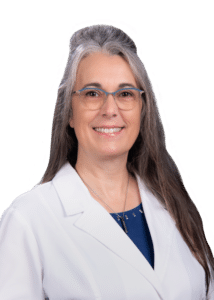 Ginny completed her associate degree in nursing in 1994 from Craven Community College and her BSN, which she received from East Carolina University, in 2006. She began her career at what was then Pitt County Memorial Hospital before transferring to a clinical practice closer to home. She always dreamed of returning “home” to ECU Health, however, and she did just that in 2009.
Ginny completed her associate degree in nursing in 1994 from Craven Community College and her BSN, which she received from East Carolina University, in 2006. She began her career at what was then Pitt County Memorial Hospital before transferring to a clinical practice closer to home. She always dreamed of returning “home” to ECU Health, however, and she did just that in 2009.
Now, Ginny’s mother can celebrate with her as she is honored as a Great 100 Nurse. “My mother cried for joy, and I was so excited to tell my family and leadership I received this recognition in my 30th year of service,” she said. Ginny said she was honored for her colleagues to recognize her service by nominating her for this award. “No matter what the need is, I try to find a way to support others and help them become the best version of themselves. I enjoy collaborating with an excellent team who strives to support each other.” Ginny was also quick to thank her leadership for supporting her along the way. “I am thankful to leadership who have helped me grow in my current role over the past nine years,” she said.
Ginny highlighted that having 19 Great 100 Nurse honorees was a nod to the support ECU Health provides its nurses every day. “I can only imagine that ECU Health is proud to know they have supported the professional growth and development of all the nurses who received nominations. For the 19 being honored, I am thankful I am a part of this elite group. We are living the mission and vision of ECU Health each day, and I feel blessed by God to be a part of something so much larger than myself.”
Rebecca Hagee
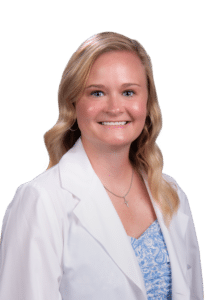 Rebecca Hagee, a staff nurse III in the surgical oncology clinic at ECU Health Cancer Center, began her career at ECU Health six years ago after graduating from Pitt Community College with her associate degree in nursing. She recently obtained her BSN from the University of North Carolina at Wilmington in 2023.
Rebecca Hagee, a staff nurse III in the surgical oncology clinic at ECU Health Cancer Center, began her career at ECU Health six years ago after graduating from Pitt Community College with her associate degree in nursing. She recently obtained her BSN from the University of North Carolina at Wilmington in 2023.
While Rebecca always knew she wanted to be a nurse, she initially thought she wanted to work in pediatric oncology. “I saw the movie Patch Adams at a young age, and I had my heart set on pediatric oncology,” she said. “Then I started my career on a general surgical unit, but I knew I wanted to work in oncology. When my current role became available, it was a perfect combination of my two interests.” Whatever her role, Rebecca said her goal in life is to “make an impact, and nursing gives me the opportunity to do that every day.”
When she learned she was a Great 100 Nurse, Rebecca said it was a surprise. “I still consider myself a ‘new’ nurse,” she explained. “I never in all my life expected to be presented with such an honor, and I’m so thankful for this opportunity to be recognized for everything I have poured into my nursing career.”
While she acknowledged that she strives to be there for patients during the hardest times of their lives, Rebecca also credited ECU Health’s support in being an honoree. “I would never have had this opportunity without ECU Health’s leadership. It has presented me with two of the best managers and assistant managers who encourage and push their team members to be the best they can be.”
Jennifer Lewis
 Jennifer Lewis, the outreach coordinator for ECU Health Medical Center Cancer Care, has worked for ECU Health for 32 years, 27 of them as a nurse. Jennifer got started at ECU Health Beaufort Hospital at the age of 18 as an emergency department (ED) clerk. “As long as I can remember, I wanted to be a nurse. I’ve always been impressed with nurses; they’re intelligent, kind and relatable. I worked in the ED to see what the healthcare setting was like,” she said.
Jennifer Lewis, the outreach coordinator for ECU Health Medical Center Cancer Care, has worked for ECU Health for 32 years, 27 of them as a nurse. Jennifer got started at ECU Health Beaufort Hospital at the age of 18 as an emergency department (ED) clerk. “As long as I can remember, I wanted to be a nurse. I’ve always been impressed with nurses; they’re intelligent, kind and relatable. I worked in the ED to see what the healthcare setting was like,” she said.
Jennifer liked what she saw, and she completed her associate degree in nursing from Beaufort County Community College before returning to ECU Health Beaufort Hospital, now as a nurse. “I was born at that hospital and had all three of my daughters there. It was home,” Jennifer said.
After getting her BSN from the University of North Carolina in Wilmington, which she was able to do through ECU Health’s tuition reimbursement program, she found a position at the ECU Health Medical Center and made the move to Greenville. “Life takes you down roads you don’t expect, but I love it,” she said.
Jennifer was shocked to learn she was a Great 100 Nurse honoree. “I’m pretty new at the Medical Center, so to know I’d been nominated by my peers was above anything I imagined,” she said. “It’s the ultimate compliment, and I’m humbled to be among the 19 who represent ECU Health.” Without the support of her team and ECU Health, Jennifer said she wouldn’t be who she is today. “I’m thankful ECU Health,” she said. “I appreciate working somewhere where they recognize nurses for their achievements and support and grow nurses. Becoming a nurse was by far one of the best decisions of my life, and I can’t imagine doing anything else.”
Kelly Trout
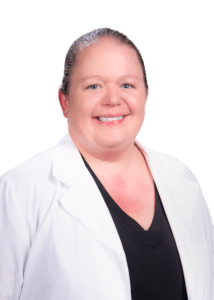 A staff nurse III in the medical oncology unit at ECU Health Medical Center, Kelly Trout has been a nurse, and has worked at ECU Health, for 15 years. “I got my bachelor’s in biology and psychology, but in 2007 I went back to school at Pitt Community College and got my nursing degree,” Kelly said. The inspiration to be a nurse came from her mother, who was a neonatal intensive care unit (NICU) nurse for 45 years. “I thought I wanted to be a doctor, but I enjoy direct care and hands-on patient interaction,” she said. A clinical rotation in medical oncology, as well as her family history of cancer, strengthened her decision to work in medical oncology. “It’s something I’m passionate about and it’s where I need to be.”
A staff nurse III in the medical oncology unit at ECU Health Medical Center, Kelly Trout has been a nurse, and has worked at ECU Health, for 15 years. “I got my bachelor’s in biology and psychology, but in 2007 I went back to school at Pitt Community College and got my nursing degree,” Kelly said. The inspiration to be a nurse came from her mother, who was a neonatal intensive care unit (NICU) nurse for 45 years. “I thought I wanted to be a doctor, but I enjoy direct care and hands-on patient interaction,” she said. A clinical rotation in medical oncology, as well as her family history of cancer, strengthened her decision to work in medical oncology. “It’s something I’m passionate about and it’s where I need to be.”
“I was shocked,” Kelly said of learning she was a Great 100 Nurse honoree. “These Great 100 nurses are doing something special, and I wondered – am I really one of those nurses? It’s a total honor.”
One of the biggest projects Kelly said she’s proud of starting in her unit is Santa’s Hope (previously Santa’s Workshop), where staff donate gifts for kids and adults and patients with cancer can then “shop” for their friends and family without compromising their immune system by going out in crowds. “We’ve had some wonderful stories. Little things like that make a difference, and I’m honored to be a part of this program.”
That ECU Health has 19 nurses on the Great 100 list is pretty special, she said. “It shows there are nurses who have their whole hearts invested in this and is representative of the care ECU Health provides,” she said. “It’s a wonderful way to advertise the care we provide and put our name out across the state.”
Katie Elliott
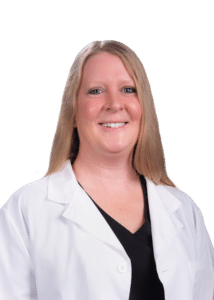 Katie Elliott is a staff nurse IV in the radiation oncology clinic at ECU Health Medical Center, where she’s worked for nearly 15 years. She originally obtained her associate degree in nursing at Beaufort Community College and started her career at ECU Health the same year on the traumatic brain injury inpatient rehabilitation unit. In 2019, she transitioned to radiation oncology, and in May, she received her BSN from Fayetteville State University.
Katie Elliott is a staff nurse IV in the radiation oncology clinic at ECU Health Medical Center, where she’s worked for nearly 15 years. She originally obtained her associate degree in nursing at Beaufort Community College and started her career at ECU Health the same year on the traumatic brain injury inpatient rehabilitation unit. In 2019, she transitioned to radiation oncology, and in May, she received her BSN from Fayetteville State University.
Katie knew from an early age she enjoyed helping people; however, a high school allied health class solidified her decision to become a nurse. Still, she was surprised to find out she was a Great 100 Nurse honoree. “I was so excited, I awakened my husband early in the morning, when I read the letter,” she laughed. “It’s an honor to know your teammates care enough to nominate you for such an amazing award.”
That nomination is the result of a dedication to her team and her patients. “I work hard, and my team sees how much I care,” Katie said. “Not just for my patients. I want to be sure our team is okay too. We take better care of our community by taking care of each other. I don’t just go to work, do my job, and go home. I want to be involved.”
That attitude is one that Katie sees reflected across the ECU Health system. “We go above and beyond in the care we provide for our patients and our communities,” she said. “I recommend ECU Health to anyone. Family members and myself have been patients here. It is comforting to know there’s a place close to home, delivering safe and compassionate care.”
The recipients will be honored at a statewide gala in September, to be held in Concord, North Carolina.
The Brody School of Medicine at East Carolina University is among the top-performing medical schools in the country when it comes to providing an affordable education for future clinicians, according to a new study from the American Association of Medical Colleges.
Nationally, four out of five medical school graduates finish their education with more than $100,000 in debt. As part of its mission to train the next generation of physicians committed to serving the state, with a strong focus on training family care providers, Brody-trained physicians receive one of the highest-value medical educations in the country.
“It is exceptionally gratifying to know that the Brody School of Medicine is leading the way in making a career in medicine affordable and accessible for future physicians across North Carolina,” said Dr. Michael Waldrum, dean of Brody and CEO of ECU Health. “The tremendous need for more physicians, particularly those who practice family medicine and serve in rural communities, serves as our compass as we continue toward our mission. We are fortunate that this need is widely recognized by statewide leaders who are committed to supporting us in our mission. This recent report from the American Association of Medical Colleges is a reminder of why Brody is such an important asset for North Carolina and its citizens.”

The financial flexibility that Brody-trained physicians have upon graduation directly supports the medical school’s ability to produce family medicine physicians which is among the highest-need specialties nationally, particularly in rural communities. Brody ranks in the top 10% of U.S. medical schools for graduating physicians who practice in the state, in primary care and in underserved areas. Brody’s most recent class – the Class of 2023 – is a snapshot of Brody’s unique mission, with 52% of graduates matching into primary care residencies, including obstetrics and gynecology, and 44% matching to residency programs in North Carolina.
“The Brody School of Medicine has a rich legacy of preparing mission-driven physicians who touch the lives of so many through a career in health care,” said Dr. Jason Higginson, executive dean of Brody. “Not only do our medical students receive a high-quality education at Brody, they graduate supported and well-prepared to join the physician workforce and enter areas of practice that are most needed, like family medicine. I could not be more proud and grateful of the Brody faculty and staff. Their passion and expertise make our academic health care mission possible.”
